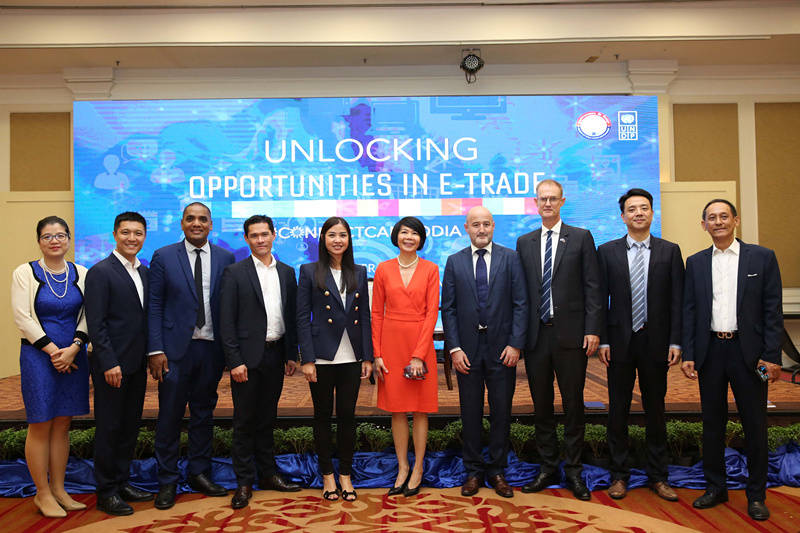

As the Belt and Road Initiative flourishes in and beyond neighboring countries of China, Cambodian entrepreneurs stand ready to embrace opportunities brought along by Chinese counterparts in the booming e-trade industry.
On Nov 16, the Government of Cambodia, the UN Development Programme, potential investors, and private companies, including Shenzhen 4PX Express Co., Ltd., under the Alibaba Cainiao Logistics Group, gathered to discuss the potential for e-commerce and cross-border trade at the #ConnectCambodia Forum in Phnom Penh, Cambodia.
#ConnectCambodia links up with the China-proposed Belt and Road Initiative (BRI) to showcase how regional integration, technologies, and innovations have created new development opportunities to advance cross-border trade in Cambodia.
Proposed by President Xi Jinping in 2013, the BRI is an ambitious effort to improve regional cooperation and connectivity through trade, investment, and infrastructure. The BRI—or the Silk Road Economic Belt and the 21st Century Maritime Silk Road—includes more than 100 countries and international organizations, based on the ancient Silk Road land and maritime routes.
Through the BRI, e-commerce and e-trade could support productive activities, decent job creation, entrepreneurship, creativity, and innovation, and encourage the formalization and growth of small and medium-sized enterprises, said Pauline Tamesis, Resident Representative for UNDP in Cambodia and Resident Coordinator for the entire United Nations system in the country, in her opening remarks at the forum.
In fact, the “Digital Belt and Road” is an important component of China’s strategy in BRI countries. According to the BRI Action Plan unveiled in March 2015, the digital component of the Initiative will focus on the construction of cross-border optical cables and mobile networks as well as the development of e-commerce between China and BRI countries, including Cambodia.

(Photo courtesy of ShopRunBack)
Sophie Meas, a Cambodian entrepreneur and co-founder of ShopRunBack, originally was based in France but has returned home. Meas sees rising opportunities, particularly with the BRI, not just for her company, but for consumers and entrepreneurs across Cambodia.
"Cambodia today is developing rapidly. With our very eyes we can see change almost daily. I’m very excited about bringing our company to Cambodia because we want to be a part of the country’s development story. Also, Cambodia is a prime location as it’s located in the middle of Southeast Asia,” Meas told People’s Daily overseas social media.
The company Sophie co-founded, ShopRunBack, transforms the returns experience for both customer and retailer combining a strong reverse logistics network with next generation software. They help leading online retailers provide a seamless, customer-friendly returns solution, increasing customer satisfaction and boosting sales.
Local entrepreneurs, like Meas, are extremely optimistic about the possibilities of the Belt and Road Initiative and hope to shake things up in Cambodia.
"In Cambodia, online services have not quite taken off like neighboring countries. You know, in Cambodia, they do online business but only through Facebook or Instagram. Also, in Cambodia, they only use motorbikes for delivery. There are several barriers that restrict Cambodians from accessing the market: language, logistics, connections, and more. The Belt and Road Initiative helps us to connect to markets in China and all the way to Europe. Working with 4PX and other companies from China will help local people to buy, sell, and trade in a larger market” Meas said.
Meanwhile, Shenzhen’s 4PX Express, which was in cooperation with Meas’s company, is also looking to expand in the spirit of BRI, Steven Li, senior vice president of 4PX Express, noted at the forum.
"We already ship around 200 thousand parcels a year from China to Cambodia. So, we are not starting from zero. However, we know currently the service level is not so good, user experience is also not good. So, we are here to help Cambodian buyers to have a better user and buying experience,” Li told People’s Daily overseas social media. “We are also looking to collaborate with local partners.”
The Belt and Road Initiative and 4PX have big ambitions for Cambodia, not only as a corridor for trade, but as a potential market.
The BRI provides new opportunities for Cambodia to leverage resources and international cooperation to support the development of the cross-border e-commerce sector. As a leading global force in the digital economy, China is an example of the value in investing in information and communications technology and supporting small and medium-sized enterprises (SMEs) to grow through e-commerce.
Li thinks the BRI presents “an opportunity for all the countries across this road.” He mentioned that China has developed a lot of infrastructure knowhow and has invested in major countries and regions including the United States, Europe, and Australia.
"I think we can help the local customers to buy Chinese products easily, as well as I sell [Cambodian products] within China. I also believe we can generate jobs here, with One Belt and One Road initiative,” Li concluded.

(Photo courtesy of UN in Cambodia)

 Award-winning photos show poverty reduction achievements in NE China's Jilin province
Award-winning photos show poverty reduction achievements in NE China's Jilin province People dance to greet advent of New Year in Ameiqituo Town, Guizhou
People dance to greet advent of New Year in Ameiqituo Town, Guizhou Fire brigade in Shanghai holds group wedding
Fire brigade in Shanghai holds group wedding Tourists enjoy ice sculptures in Datan Town, north China
Tourists enjoy ice sculptures in Datan Town, north China Sunset scenery of Dayan Pagoda in Xi'an
Sunset scenery of Dayan Pagoda in Xi'an Tourists have fun at scenic spot in Nanlong Town, NW China
Tourists have fun at scenic spot in Nanlong Town, NW China Harbin attracts tourists by making best use of ice in winter
Harbin attracts tourists by making best use of ice in winter In pics: FIS Alpine Ski Women's World Cup Slalom
In pics: FIS Alpine Ski Women's World Cup Slalom Black-necked cranes rest at reservoir in Lhunzhub County, Lhasa
Black-necked cranes rest at reservoir in Lhunzhub County, Lhasa China's FAST telescope will be available to foreign scientists in April
China's FAST telescope will be available to foreign scientists in April